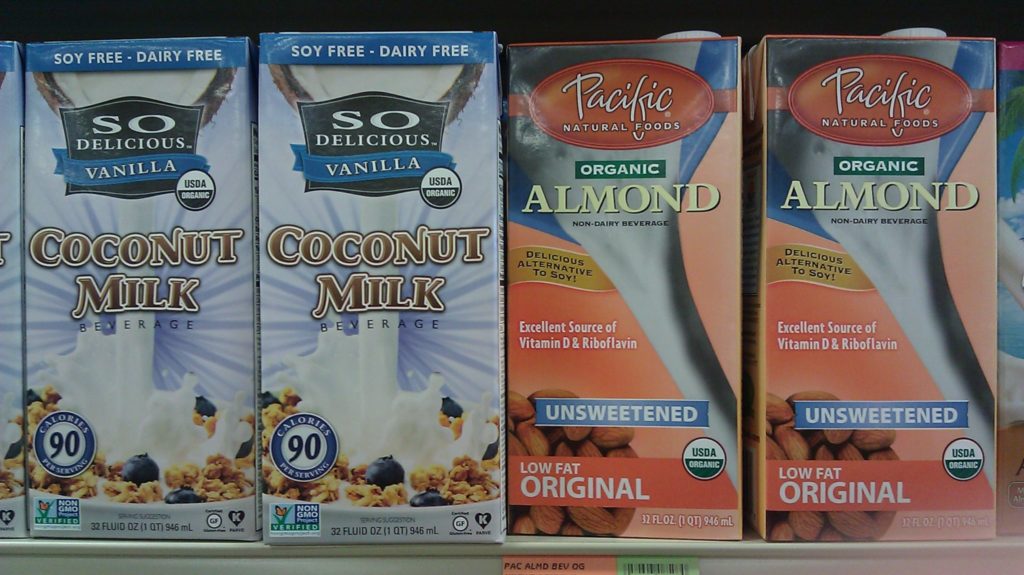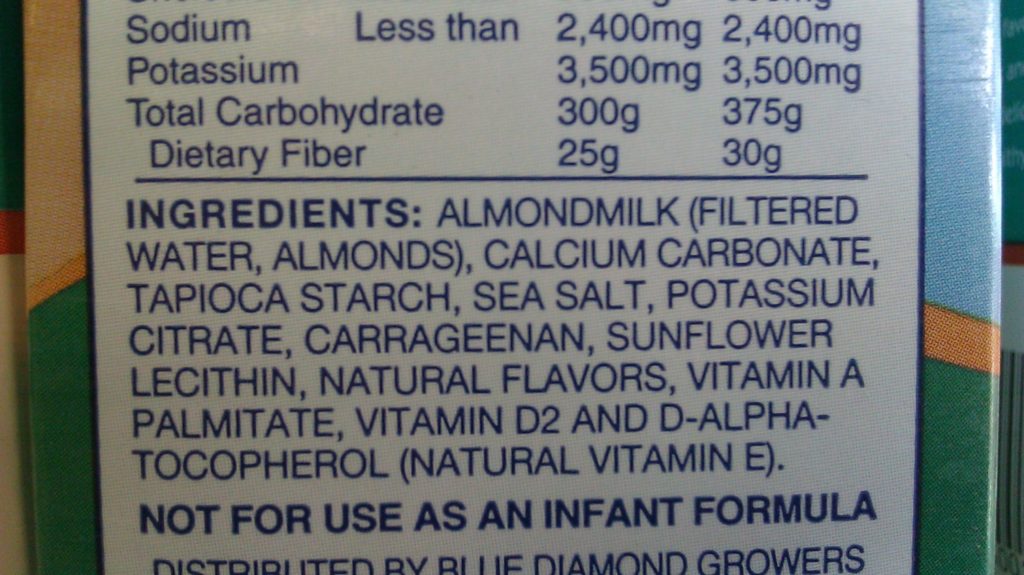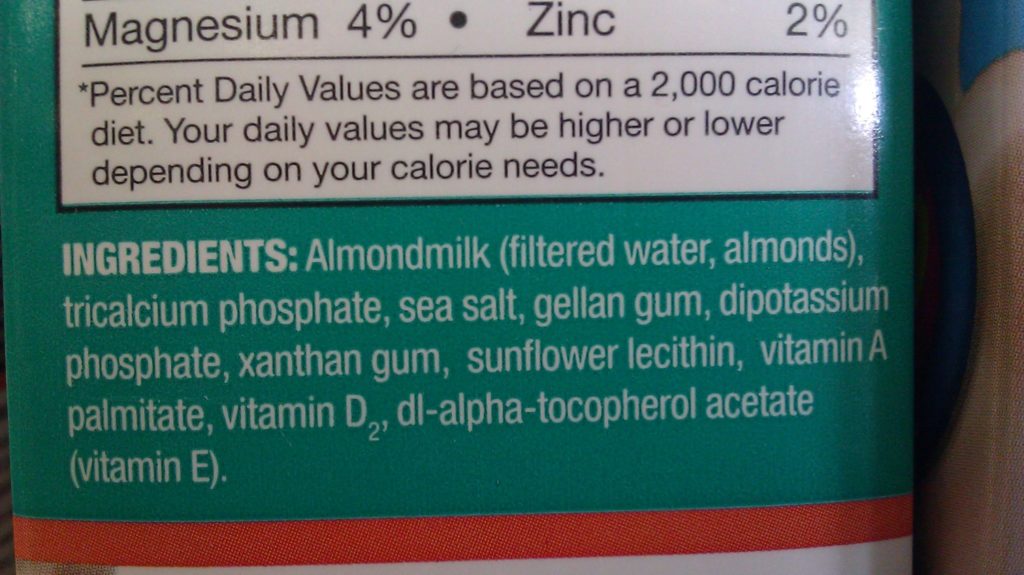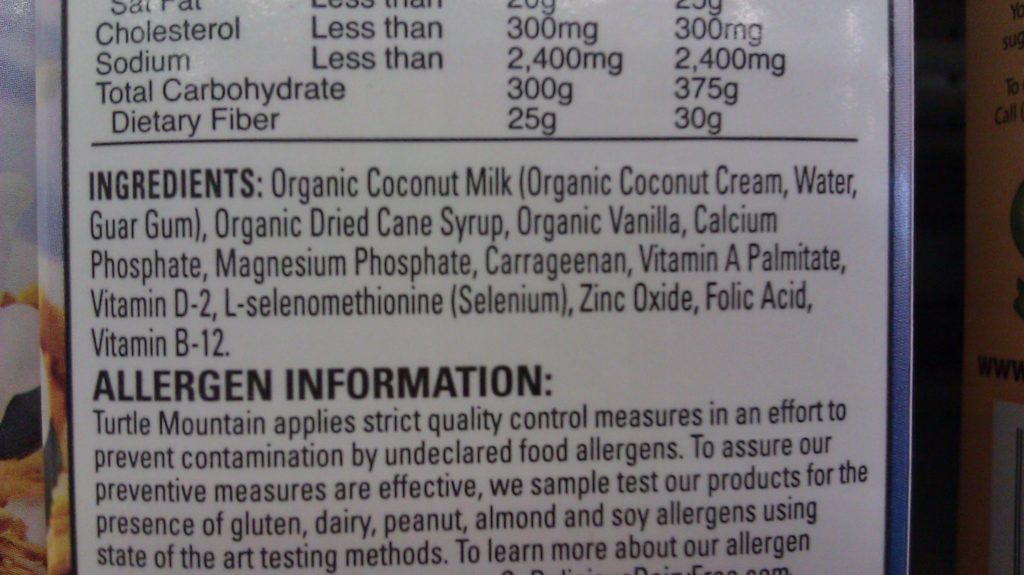 Organic coconut milk and almond milk are common purchases at the health food store by those with dairy allergies. Usually, these people are savvy consumers who know enough nutritionally to avoid soy milk with its endocrine disrupting isoflavones and gastric inflaming phytates. Rice milk is also steadily declining in popularity as it is really not much more than a glass of sugar water nutritionally speaking.
Organic coconut milk and almond milk are common purchases at the health food store by those with dairy allergies. Usually, these people are savvy consumers who know enough nutritionally to avoid soy milk with its endocrine disrupting isoflavones and gastric inflaming phytates. Rice milk is also steadily declining in popularity as it is really not much more than a glass of sugar water nutritionally speaking.
Organic, unsweetened coconut milk and almond milk in cartons seem like great alternatives at first blush, but are they really as “healthy” as people believe?
Let’s take a look at the labels. I was shocked at what I found.
Check out the labels of the three brands I photographed. I checked all the brands, by the way, and they all contained the same dangerous additives I’m about to describe.

First, Vitamin A Palmitate is added, the synthetic version of Vitamin A. I personally avoid synthetic versions of Vitamin A like the plague. Every single multi-vitamin I’ve ever examined contains some form of synthetic A, including the so called “whole foods” multis.
Synthetic vitamins are the chemical mirror images of the real, natural versions. They can cause imbalances over time. Even small amounts of the synthetic fat soluble vitamins like Vitamin A can prove toxic and should be strictly avoided!
The Organic Consumers Association warns that isolated vitamins such as those produced synthetically cannot be recognized or metabolized by the body in the same way as the natural version.

Large doses of natural vitamin A are well tolerated by the body as established by researchers decades ago, however. Traditional diets contain 10 times or more of the RDA of this nutrient with no ill effect. However, synthetic vitamin A is associated with birth defects and bone fractures. It has no benefit in the diet whatsoever.

The second really bad additive in these organic cartons of coconut milk and almond milk is Vitamin D2. Vitamin D2 is a form of the wonder vitamin that you should take great pains to avoid.
In all known cases of Vitamin D toxicity where the dose was intentional, Vitamin D2 was the culprit. By comparison, Vitamin D3 is much less toxic and requires an enormous or even an accidental dose to produce any toxic effect.
Vitamin D2 is manufactured industrially by irradiating yeast. It is dangerous for D2 to be added to any food product particularly if this product would be given to children, where toxicity symptoms would appear at much lower dosages.
None of the store brands of cartoned coconut milk or almond milk were free of these dangerous and synthetic versions of the fat soluble vitamins!
Notice also that carrageenan is present in 2 of the 3 products as well! Dr. Andrew Weil has been telling people to avoid carrageenan since 2002.
Carrageenan is so toxic and inflaming to the human digestive system that this food additive is formally classified by the International Agency for Research on Cancer (part of the World Health Organization) as a potential human carcinogen.
In my view, it would be a mistake to purchase and consume these items. They are in no way health promoting or beneficial, particularly for growing children!
Healthy Alternatives to Coconut Milk and Almond Milk in Cartons
Coconut milk and almond milk should be healthy and they can be if they are produced at home without these dangerous additives. I wrote an in depth post on how to easily make these nondairy beverages yourself. This recipe for wild rice milk is a good option as well.
Believe it or not, even organic coconut milk in BPA free cans would be a better alternative to cartons of coconut milk based on my label inspection!
Check out my video on homemade coconut milk and my article on how to make healthy DIY almond milk, fermented to add probiotics and enzymes to boost immunity and improve digestion.
Sarah, The Healthy Home Economist
Sources
From Seafood to Sunshine: A New Understanding of Vitamin D Safety






We cannot trust what this woman has to say. I checked the cartons as well and the label are NOTHING LIKE IT SHOWS IN THE PICTURE! So Delicious is one of the best products out there. I have spoken to not only the customer service representative, but also the quality control department. Do you know, that the coconut milk products are certified Vegan, Kosher, Gluten Free, Organic, BPA Free, Non-GMO? They test ALL the product and ingredients before, during, and after the finished product? They are approved by FAAN, and the Organic Network.
Before believing this person blogging and posting misinformed information, speak to the actual company! So Delicious is the only one that is very open and provided me with any answers to any questions I have ever asked. That company actually cares.
well some of us don’t like coconut milk and the vit A Pailmitate seems to be ubiquitous in the other non dairy milks..almond hemp and oat. Thta’s why I am urging people to voice their displeasure where it will do the most good -withthe folks that make it..If enough people complain they will change because it will hurt their bottom line.
Hi Sarah…I am Canadian too and was looking at the label of my almond milk that I give to my daughter who is just over one year old. Ingredients are: filtered water, almonds, tapioca starch, natural vanilla flavour, calcium carbonate, sea salt, potassium citrate, carrageenan and sunflower lecithin.
Vitamin A, D and C are listed as 0%, Calcium is 30%, Iron 4%, Vitamin E 15%, Phosphorous 2% and Magnesium 8%.
Let me know what you think, or anyone else for that matter!
Thanks!!!
I really hope you are really researching this before causing such a scare. What makes me wonder is your comment about synthetic vitamin A, specifically, causing birth defects. That statement is both true and extremely misleading. Too much of ANY vitamin A causes birth defects. This was what was taught in my advanced biology nutrition class when I was in college, as well as what my OB said when I was pregnant.
why take a chance? voice you opinion with their customer service depts online.we have strength in numbers and should become activists for our cause..If we all do it together, we can change their product.
THE LABELS ON THE FIRST PHOTOS – DO NOT MATCH THE NUTRITIONAL FACTS PHOTOS….. COME ON PEOPLE…. JUST BECAUSE SHE IS POSTING A BLOG….DOES NOT MEAN ITS TRUE!!!
QUALIFICATIONS? ANY PROOF OTHER THAN HER ONE SOURCE????
I CAN PROVIDE ONE SOURCE TO COUNTER HER ONE SOURCE TOO! ANYONE COULD USING THE INTERNET!!!
BY THE WAY… CARRAGEENAN…. THERE ARE 2 TYPES OF CARRAGEENAN!!!! ONE IS UNGRADED AND ANOTHER IS GRADED. DO YOUR RESEARCH BEFORE SAYING ITS BAD IN GENERAL!!!! SO FRUSTRATING!!
Can you send me info on your qualifications on giving health and nutrition advise.
I can forward you actual real photo’s of these products and labels if you like.
Thanks
Hey Sarah,
I’m not quit sure if you took those pictures or there stock photo’s but we buy both of those products you have in the picture and the nutrition and ingredients labels on our containers look nothing like yours.
Pacific Foods organic Almond Milk ( unsweetened Original: water, organic almonds, organic rice starch, organic vanilla, sea salt, natural flavors, carrageenan)
So Delicious Coconut Milk Organic ( unsweetened: organic coconut milk, water, organic coconut cream, carrageenan, guar gum).
So like i said not sure if those labels belong to those products. Can you send me info on your qualifications on giving health and nutrition advise.
I can forward you actual real photo’s of these products and labels if you like.
Thanks
If you bought them in Canada, they will not have the same ingredients. The US versions of So Delicious at least does have all those ingredients as I have bought it there and imported it. The Canadian version does not because of our food additive laws.
Vitamin A Palmitate — This is a synthetic version of vitamin A that is associated with birth defects and bone fractures while providing zero health benefits. Other side effects of this isolated chemical form of vitamin A include tumor enhancement, joint disorders, osteoporosis, extreme dryness of eyes, mouth and skin, enlargement of liver and spleen, and immune suppression. As an added note, vitamin A toxicity, known as hyper-vitaminosis, always results from consuming too much synthetic “purified” vitamin A and never from naturally occurring vitamin A found from natural food sources. Still haven’t thrown out your store-bought “almond milk?”
Vitamin D2 — This synthetic chemical needs to be avoided at all costs as toxicity occurs easily with ingested synthetic D2. This occurs especially in children. In fact, a single dose of synthetic vitamin D of 50mg or greater is toxic for adults. The immediate effect of toxicity is abdominal cramps, nausea, and vomiting. In time, as toxicity builds, the result is a buildup of irreversible deposits of calcium crystals in the soft tissues of the body that damage the heart, lung and kidneys.*
If someone said, “I drink almond milk instead of raw milk – is that good?” What would your reply be?
Ellen, what is “raw milk”? Cow’s milk or milk that comes from another animal’s udder? I just try to differentiate when I use the word “milk.” I am an animal rescuer, and I encounter a lot of people who will rescue little kittens and give them what they call, “milk” and I say, “cow’s milk? that’s for baby cows, not baby cats…they could develop diarrhea and die from that, so please don’t use cow’s milk for a different species.” And then that makes them think. We are the only species that drinks “milk” from another species. Is raw milk unpasteurized, unprocessed cow’s milk?
Thanks. 🙂